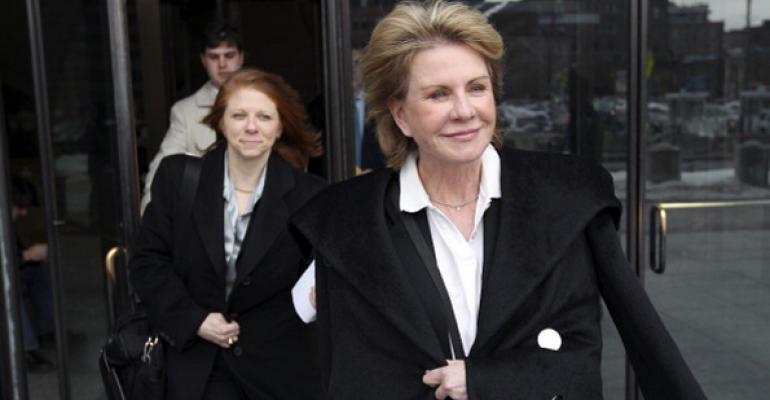As financial advisors take over more and more of their clients’ needs, the case of best-selling author Patricia Cornwell’s $51 million verdict against Anchin, Block & Anchin presents a cautionary tale.
"This is a shot across the bow for financial advisory firms...as they ramp up their services," says Arthur Laby, a law professor at Rutgers University who specializes in securities regulation.
Anchin touted itself to Cornwell as the firm that could “do everything for its clients including buying and delivering their toilet paper,” according to court documents. But it got into trouble when it failed in the very basics of risk adverse advising, says Jim Anderson, a Cates Mahoney lawyer specializing in investment misconduct.
Doing things outside the firm’s core business can cause businesses to miss key red flags and fail to use proper checks and balances, Anderson says. “If you’re a tax firm, do taxes, if you’re an auditing firm, audit,” he says.
“There’s always a very strong possibility that evolving business models will bring challenges,” says Chris MacDonald, author of the Business Ethics Blog and Director of the Jim Pattison Ethical Leadership Program at Ryerson University’s Ted Rogers School of Management. In this case, doing everything might have led to the firm’s current problems.
The trouble started for Anchin when Cornwell—the author of the murder mystery series starring medical examiner Kay Scarpetta—sued her wealth management firm Anchin in 2009, claiming the New-York based advisory business improperly invested $89 million of her funds.
In Cornwall’s July 2011 amended complaint, she accused the firm of negligently borrowing money, writing out checks she never authorized and losing millions on a risky investment strategy she never approved. Further, the financial woes allegedly distracted the author, causing her to miss a book deadline and $15 million in an advance and commissions.
Meanwhile Achin claimed the author was unfairly trying to make the firm and its employees “scapegoats” for Cornwell’s problems. It alleged during the seven-week trial that Cornwell’s spending habits, not mismanagement, drained the author’s funds. Achin also claimed that Cornwell actually owed the firm over $500,000 for services performed.
Despite revealing specific examples of Cornwell’s exorbitant spending habits—which included luxury helicopters, a $40,000 a month Manhattan apartment and an expensive mortgage on a Mansion near Boston—a Massachusetts federal jury found in favor of the author on Tuesday. It awarded Cornwell $50.9 million in damages on counts of negligence, breach of fiduciary duty and breach of contract for professional services.
Managing partner of Anchin, Frank Schettino called the verdict disappointing and that the firm was exploring all of its legal options, including appeal.
“For more than 90 years, the professionals at Anchin have built a reputation for honesty and integrity,” Schettino says. “The firm will endure despite today’s outcome.”
But Anderson says that firm can’t blame the author entirely for her decisions. The firm had a duty to keep the author and her wife from making bad financial decisions, he says.
“Your job is to convey and advise against self-destruction,” Anderson says. At some point, the firm no longer has the right to say, “She’s just a crazy author,” he says.
Advisors have to make sure that they have those risk profiles in place and that they regularly review investment strategies with their clients to avoid situations like that of Anchin, Anderson says.
Further, MacDonald says this is not a standard financial advisor case, citing Anchin’s role as not just Cornwell’s financial advisor, but also its role as her accounting firm and power of attorney.
Anchin had argued that the firm and Cornwell’s advisor may have owed the author fiduciary duty in some areas, she was claiming they owed her a fiduciary duty across the entire spectrum of their relationship. But the jury found that the firm's advisory role that required it to maintain the client’s best interests in all areas, MacDonald says.
“Courts have traditionally taken fiduciary duty and trust issues very seriously,” MacDonald says. Whether there was excessive spending or not, Cornwell put her trust in the firm to ensure that her money was safe.
Firms that have a strict fiduciary duty need to think very carefully about the decision that clients are making and whether those decisions are in the client's best interests, Laby says. "The broader the relationship, the broader the duty," he says.
But before advisors start to worry about the impact the case may have on the industry at large, MacDonald says this particular case is unlikely to set any precedents. There were too many questions at issue that were very specific to Cornwell’s relationship with Anchin, he says.
To be on the safe side, Anderson recommended that firms document all discussions and transactions with clients, as well as disclose and advise on all risks associated with various investment strategies.
“The fiduciary duty, in its purest sense, is putting the client’s needs above your own,” Anderson says.






